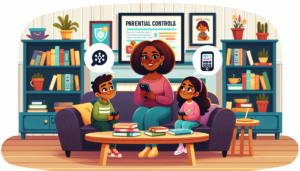The Better Business Bureau reports that online scams have skyrocketed during and following the pandemic, with fraudsters achieving greater success than ever before as consumers spend an unprecedented amount of time online.
Key Takeaways:
-
- Beware of Unbelievable Prices: Scammers often lure young people with incredibly low prices for high-end items, only to deliver knockoffs or nothing at all. These transactions often lead to stolen credit card information and personal data.
- Fake Contests and Prizes: Online competitions and lotteries are a common trap for children. These scams can involve hefty entry fees or personal information sharing, with little to no reward, and often, the theft of creative work.
- Phishing and Smishing Dangers: Phishing websites and smishing texts are sophisticated scams designed to steal personal information. They often masquerade as legitimate sources, offering enticing deals or false alerts.
1. Unbelievable Prices for Expensive Goods
You’ve probably seen it: an ad for an iPhone for a ridiculously low price or a gorgeous lace dress for only $10. Scammers know these low prices are irresistible bait for young people. As you probably guessed, the gadget or luxury item your child orders never shows up or your child might receive a knockoff version. The scammer disappears from the internet, leaving you with very little recourse.
These scammers are after consumers’ information. Your child will most likely pay for the item with a credit card, allowing the scammers to steal the card number. They may also ask for personal information from your child, like an email address or phone number, and then sell that information for profit.
This kind of fraud is relatively easy to spot if you know what to look for. Teach your children these signs:
- Never purchase items that promise to come out before an official release date.
- Look for odd variations in spelling or grammatical errors.
- Never pay an advance deposit for anything.
2. Fake Contests with Fake Prizes
A chance to win money or become famous is difficult for children to resist. Online scammers are pros at taking advantage of that. Fake contests like online writing contests, talent competitions, or lotteries offer tempting prizes. But there’s always a catch—your child will have to give away sensitive information or pay money in order to participate.
One example is a literature contest. There may be an expensive entry free and, even if your child does “win,” the prize is piddly. It might be an announcement on the organization’s website or the chance to have the piece edited by the organization’s editors, which costs even more money.
These scammers may also steal the piece and publish it as their own. Most often, these details are hidden deep within a terms and conditions document. Just like adults, children never read these documents. They just check the box and pay the entry fee.
Teach your children to avoid fake contests with these tips:
- If it’s a skill-based contest, the organization can ask you to pay to participate. Your children should ask you first before they enter. Be sure you read all of the terms and conditions.
- It’s illegal for contest operators to offer fee-based ways of increasing your chances of winning.
- You should never pay money to collect your prize.
3. Phishing and Smshing
You may already be familiar with phishing, a type of online scam involving a fraudulent website or email that looks legitimate. These scammers are fishing for your personal information in order to steal your identity. There is also smishing, which combines SMS (short message service) with phishing—fraudulent text messages that aim to steal personal information.
Unfortunately, it’s quite easy for an experienced scammer to use these techniques to steal your child’s information.
- They might create a bogus site that offers free video games or free ringtones in exchange for your child’s information.
- They might send a text, looking like it’s from FedEx or the post office, saying your child needs to pay money in order to have a package delivered.
- They might send a text that says your Netflix password has expired and your child will be asked to provide personal information in order to reset the account.
Help your child avoid phishing and smshing with these tips:
- You may want to tell your child not to buy anything If your children are older and more responsible, teach them to look for the padlock by the URL showing that the site is secure.
- Teach your children to delete text messages from any number they don’t recognize. They should never click on links in texts.
- Texts from “5000” or other non-cell numbers are often scams. This signifies that scammers are using email-to-text services to hide their location.
Additional Parental Guidance Tips:
- Educate children on recognizing scam signs, such as too-good-to-be-true offers, grammatical errors in ads, or requests for advance payment.
- Encourage reading terms and conditions before entering contests.
- Instruct children to avoid unknown links in texts and to be wary of messages from non-cell numbers or suspicious sources.
Safe Lagoon offers invaluable tools for parents to monitor and control online activities, ensuring a safer digital environment for children. For more insights and tips, visit our blog!





